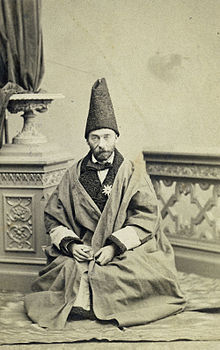Jakob Eduard Polak
| Jakob Eduard Polak | |
|---|---|

Jakob Eduard Polak
|
|
| Born |
12 November 1818 Groß-Morzin/Mořina, Bohemia |
| Died |
8 October 1891 (aged 72) Vienna |
| Occupation | Austrian physician |
Jakob Eduard Polak (12 November 1818 in Mořina; – 8 October 1891 in Vienna) was an Austrian physician, born to a Jewish family from Bohemia, who played an important role in introducing modern medicine in Iran.
Polak studied Medicine in Prague and Vienna. He was one of the six Austrian teachers invited by Amir Kabir, the Persian chief minister, as the instructors of Dar ul-Fonun, the first modern higher education institution in Iran. By his own account, he entered Iran on 24 November 1851, before the inauguration of the Dar ul-Fonun.
From 1851 to 1860, he taught medicine at Dar ul-Fonun. In the beginning, he taught in French and used a translator. Soon, the incompetence of the translators motivated him to learn Persian. He learned Persian in six months, and then taught his course in Persian.
In 1885, he funded Otto Stapf, a Viennese Botanist, to undertake a botanical expedition to South- and Western Persia. This led to the discovery of numerous new species of plants.
From 1855 to 1860, he served as personal physician of Naser-al-din Shah. In this capacity he was succeeded by French physician Joseph Désiré Tholozan.
Polak published his Persian experiences in: "Persien, das Land und seine Bewohner; Ethnograpische Schilderungen" (Leipzig, Brockhaus 1865), which belongs to the outstanding ethnographic works about 19th-century Iran.
His other works include:
...
Wikipedia
